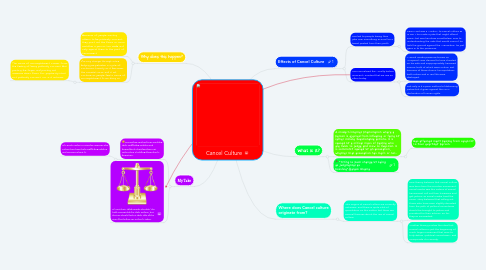
1. Why does this happen?
1.1. Because of people wanting others to be politically correct, they point out the flaws or minor mistakes a person has made and rally against them to the point of harassment.
1.2. Forcing change through online bullying perpetuates a cycle of continuous toxicity as it becomes the societal norm, and it will continue as people feel a sense of accomplishment from doing so.
1.2.1. The sense of accomplishment comes from the feeling of being politically correct. But pointing the finger and pointing out someone else's flaws for popularity/clout isn't politically correct, nor is it activism.
2. My Take
2.1. Preventing another from speaking their conflicting opinion and immediately shutting them out rather then a holding discussion is immature.
2.1.1. It is much easier to ostracize someone else rather than hear their conflicting opinion and converse about it.
2.2. It's not that I think people shouldn't be held accountable for their actions, but that we should look at their side of the story first before any action is taken.
3. What is it?
3.1. A modern internet phenomenon where a person is ejected from influence or fame by rather minute questionable actions. It is caused by a critical mass of people who are quick to judge and slow to question. It is commonly caused by an accusation, whether that accusation has merit or not.
3.1.1. Has affected many people from celebrity to your everyday person.
3.2. "Trying to push change by being as judgmental as possible"-Barack Obama
4. Effects of Cancel Culture
4.1. Has led to people losing their jobs over something as small as a tweet posted from their youth
4.1.1. Kevin Hart was a "victim" to cancel culture as in 2011 he made a joke that might offend some, but was harmless nonetheless. Due to understanding the risks that would come if he held his ground against the "cancelers" he just gave in to the pressures.
4.2. Has normalized the "Guilty before innocent" mindset that we see so often today.
4.2.1. A social media presence known as "Projared" was claimed to have cheated on his wife and inappropriately harassed minors, both of which were untrue. But because of these claims, his reputation, both online and in real life were destroyed.
4.2.2. Not only is it a poor method of delivering justice but it goes against the UN's declaration of human rights.
5. Where does Cancel culture originate from?
5.1. The origins of cancel culture are currently unknown, and there is quite a bit of speculation on the matter, but there are several theories about the rise of cancel culture.
5.1.1. One theory believes that cancel culture was born from the #Metoo movement. Social media saw the victims of sexual harassment call out their harassers and get justice, so social media tried the same. They believed that calling out those who have even slightly deviated from the path of political correctness should be brought to justice and punished for their actions. So far, they've succeeded,
5.1.2. Another theory pushes the idea that Cancel culture is just the beginning of much larger movement that aims to truly define "political correctness" and incorporate it in society.
